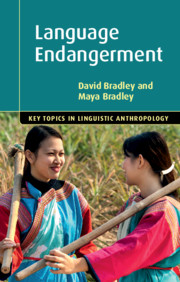Book contents
- Language Endangerment
- Key Topics in Linguistic Anthropology
- Language Endangerment
- Copyright page
- Contents
- Tables
- Acknowledgements
- 1 Introduction
- 2 Stages of Language Endangerment
- 3 Working in a Community
- 4 Identity and Attitudes
- 5 Language Knowledge and Use
- 6 The Sociolinguistic Setting
- 7 Linguistic Processes
- 8 Policy and Planning
- 9 Language Reclamation
- 10 Methodology
- 11 Conclusion
- Glossary of Terms
- References
- Index
- References
9 - Language Reclamation
Published online by Cambridge University Press: 11 November 2019
- Language Endangerment
- Key Topics in Linguistic Anthropology
- Language Endangerment
- Copyright page
- Contents
- Tables
- Acknowledgements
- 1 Introduction
- 2 Stages of Language Endangerment
- 3 Working in a Community
- 4 Identity and Attitudes
- 5 Language Knowledge and Use
- 6 The Sociolinguistic Setting
- 7 Linguistic Processes
- 8 Policy and Planning
- 9 Language Reclamation
- 10 Methodology
- 11 Conclusion
- Glossary of Terms
- References
- Index
- References
Summary
This chapter discusses various subtypes of language reclamation: revitalization, revival, renativization, nativization and heritage. A further possibility is denativization, as seen for Rumantsch in Chapter 8; this is a top-down language unification strategy, imposing an artificial standard. Sadly, heritage activities, including limited language use, is the likely future for N‖ng (Chapter 3) and many other languages around the world. Language reclamation work in a community depends crucially on the current situation of the endangered language; concerning levels and stages of endangerment, see Chapter 2. See Chapter 8 concerning the four components of language planning (Selection, Codification, Elaboration and Dissemination) for reclamation, and the required actions, such as work on orthography, pronunciation, structural and interactional patterns and vocabulary.
- Type
- Chapter
- Information
- Language Endangerment , pp. 208 - 227Publisher: Cambridge University PressPrint publication year: 2019

